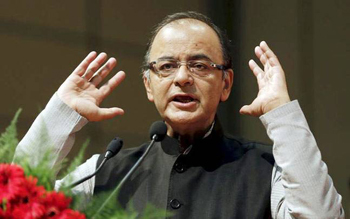New Delhi, Dec 20: After tightening rules for depositing old 500 and 1000-rupee notes, Finance Minister Arun Jaitley said on Monday evening that no questions will be asked if any amount of scrapped currency is deposited in one go but repeated deposits may raise queries.
 With nearly Rs. 13 lakh crore out of the Rs. 15.4 lakh crore worth of 500 and 1000-rupee old notes already deposited in banks, the government has changed rules to mandate that individuals can deposit over Rs. 5,000 in old currency bills only once until December 30 and that too after explaining why it had not been done so far.
With nearly Rs. 13 lakh crore out of the Rs. 15.4 lakh crore worth of 500 and 1000-rupee old notes already deposited in banks, the government has changed rules to mandate that individuals can deposit over Rs. 5,000 in old currency bills only once until December 30 and that too after explaining why it had not been done so far.
Explaining the rationale behind the move, Mr Jaitley said all exemptions to certain sectors and utilities, which had been allowed to accept the banned currency post demonetisation, ended last week and all those in possession of the old notes are supposed to deposit them with banks.
"Anyone who has old currency notes is not allowed to trade in them. He can only go and deposit them with banks," he said.
With a view to curtail queues at banks, holders are encouraged to deposit the entire holding in one go, rather than going repeatedly.
"If they go and deposit with the bank any amount of currency, no questions are going to be asked to them and therefore the 5000 rupee limit does not apply to them - but (only) if they go and deposit it once.
"But if they are going to go everyday and deposit some currency (small amounts), same person, that gives rise to suspicion that where is he acquiring this currency from. In that event a person may have something to worry about. Therefore everyone is advised whatever old currency you have please go and deposit it now," he said.
And since there is no scope now for earning any old currency because all exemptions have been waived, it makes sense to go deposit all the holding in one go, Mr Jaitley said.
"This is the objective of the order passed today."
After banning old 500 and 1,000-rupee notes on November 8, the government had allowed all of the cash holdings with any person to be deposited in bank accounts till December 30.
There was no limit on the quantity or value of the junked notes that could be deposited.
However, the government on December 17 issued a gazette notification putting restrictions on deposits henceforth.
"The deposits of old notes of Rs. 500 and Rs. 1,000 denominations have been reviewed by the government from time to time. Already more than five weeks have elapsed since the time of the announcement of the cancellation of the legal tender character of these notes. It is expected that, by now, most of the people would have deposited such old notes in their possession," an official statement said.
With a view to "reduce the queues in the banks", the government said it has now been decided that "amounts exceeding Rs. 5,000 in old notes can be deposited only once between now and December 30, 2016."
"The banks have been advised to conduct due diligence regarding the reasons for not depositing these notes earlier," the statement said.
Amounts of Rs. 5,000 or less may continue to be deposited with banks in the customer's account, as at present.
"However, cumulative deposits exceeding Rs. 5,000 between December 19 and December 30, 2016 will be as per the procedures advised by the RBI in respect of deposits exceeding Rs. 5,000," it said.
The Reserve Bank of India (RBI) too came out with deposit guideline stipulating that restrictive conditions will also apply on the cumulative deposit of such notes in a single account when it exceeds Rs. 5,000.
However, the defunct currency up to any amount can be deposited under the new black money amnesty scheme, Pradhan Mantri Garib Kalyan Yojana or PMGKY.





Comments
RBI - REVERSE BANK OF INDIA,
YAHAN GANGA ULTI BEHTI HAI,
CRAZY GOVERNMENT,
THUGLAK KA YAAD BAAR BAAR DILATI HAI
Add new comment